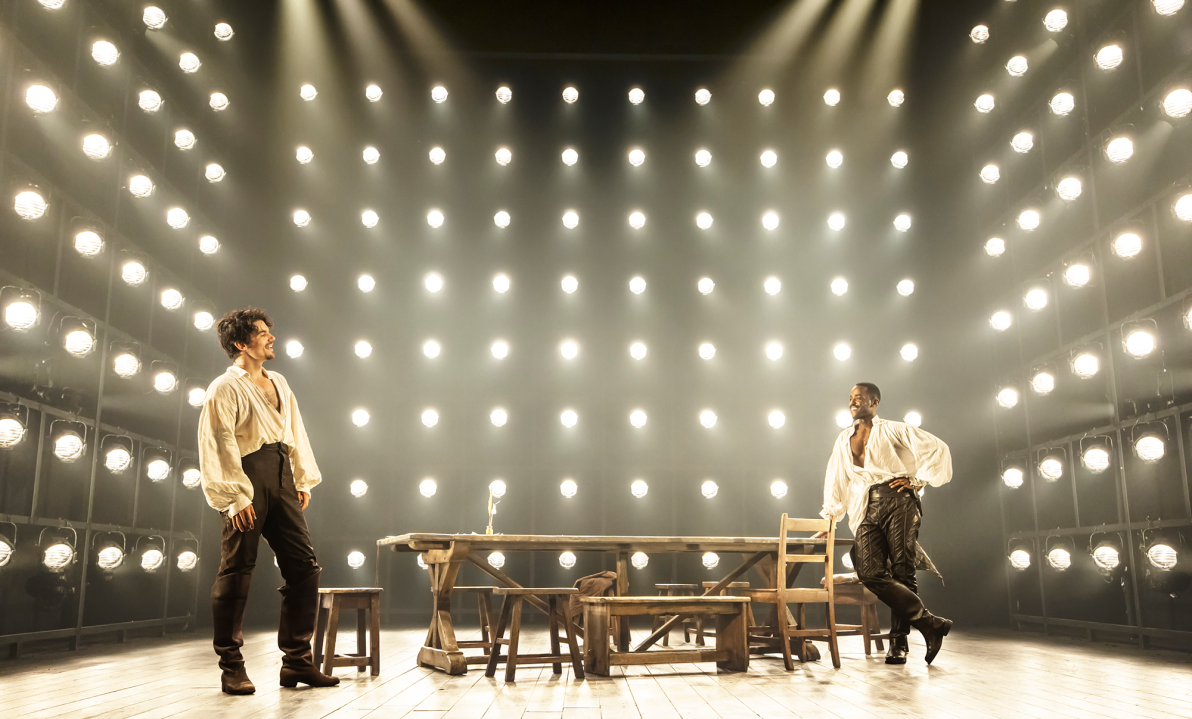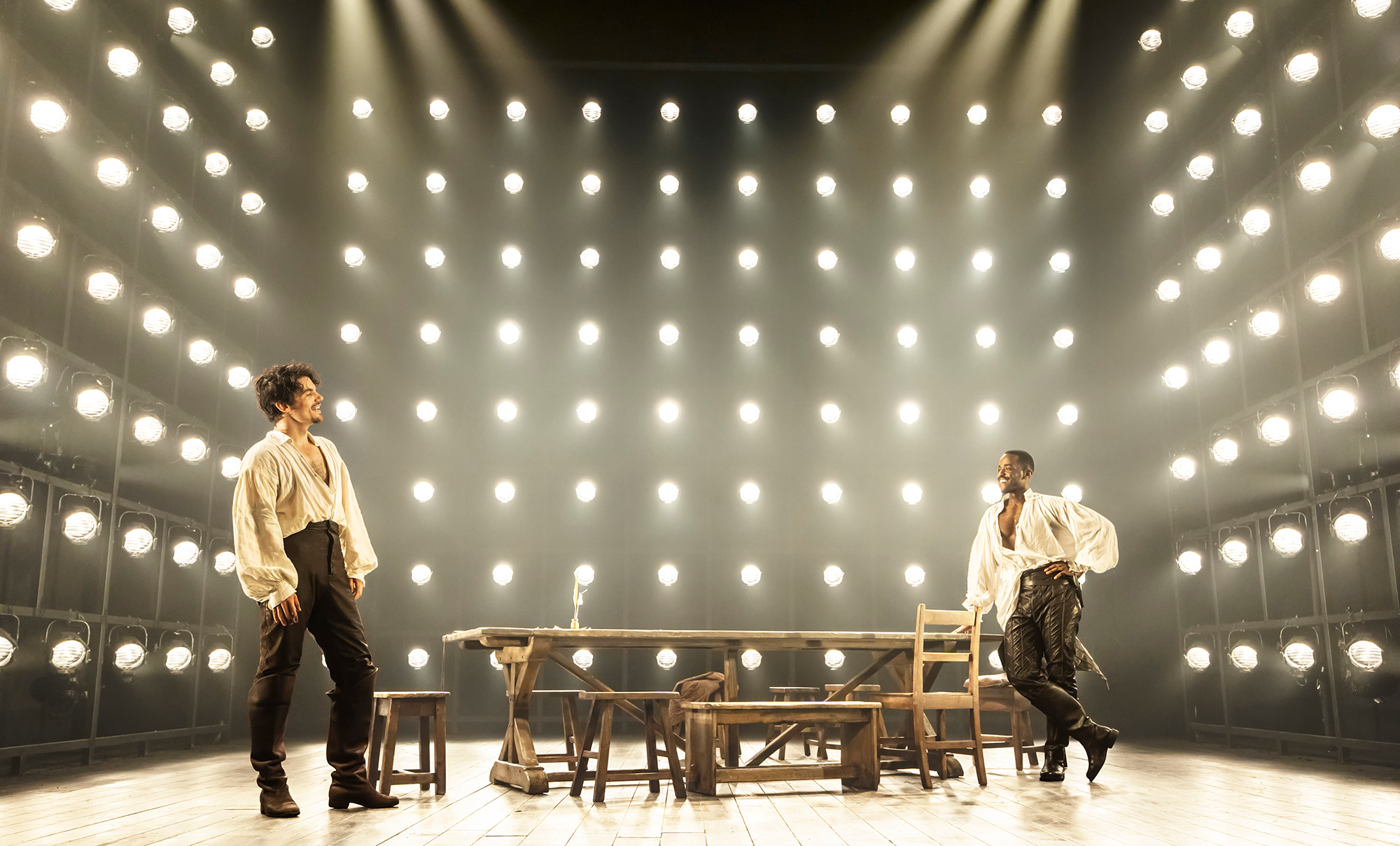
Born With Teeth is a camp two-hander starring a pair of TV luminaries, Ncuti Gatwa and Edward Bluemel, as Marlowe and Shakespeare. The year is 1591 and the great dramatists are holed up in a tavern working on an early draft of Henry VI (Part 3). Not much writing gets done. It’s all rhetoric and bombast. Marlowe is a bullying egomaniac who boasts of his ‘throbbing quill’ and parades a peacock’s feather which he strokes lasciviously. Both playwrights are gay, of course, and they live in a world that views heterosexual couplings as a mystifying aberration. Marlowe prances about on the table and re-enacts his conquests of grateful gay aristocrats. He peels off his undershirt and flings himself at Shakespeare who responds with fake reluctance. Their first embrace leads to a minor bout of fisticuffs but they soon come together as lovers.
After this, their dialogue turns into empty pillow talk. This is rather puzzling. Both men claim to be poets of genius but neither exhibits any sign of literary talent or verbal inventiveness. ‘I got a scholarship to uni,’ says Marlowe. ‘You’re just an opportunistic slut,’ says Shakespeare. ‘You’re even stupider than you look,’ replies Marlowe. They sound like a pair of rich kids bickering at a polo match. They discuss religion. ‘Christ is dead sexy,’ offers Marlowe. Shakespeare ponders the ‘ineffability’ of God whose omnipotence seems to exceed the understanding of mere mortals. ‘Ineffable,’ says Marlowe, ‘there’s nothing I wouldn’t eff.’ These are the wittiest passages in the play.
On press night, the coughing began after 60 minutes when it became clear there was no plot at all. Marlowe’s references to the earl of Essex and to Walter Raleigh’s clique of occultists were being offered as a sop to anyone with a scholarly interest in Elizabethan politics. The rutting poets are more interested in each other and they soon forget about the Henry VI script. Instead they discuss setting up a cosy love nest together. ‘Fletcher and Beaumont are getting away with it,’ says Marlowe. But who cares? Everyone knows that Marlowe is doomed to die in a tavern brawl. When he leaves to meet his fate he says, ‘I’m off. You wait there for a bit.’ That’s the calibre of their banal dialogue.
The staging by Daniel Evans is highly effective since it uses catwalk lighting and nothing else. The playing area is framed by three rigs bearing 168 golden lamps that cast a heroic radiance over the preening sex studs. At the curtain-call, they got a standing ovation. Producers use the term ‘skin-tight hit’ for commercial erotica like this. It’s shallow and silly but likely to succeed. Avoid it.
Southwark Playhouse presents a play about knife crime, The Chaos That Has Been and Will No Doubt Return, set in ‘austerity-stricken Luton’. The script follows a pair of 16-year-old lads who are making their way ‘against a backdrop of systemic neglect’, according to the press release. The boys, named Voice and Lewis, bicker and tease each other while getting drunk on neat gin. They make a tremendous din. Both the actors holler their lines at top volume and they like to impersonate mongrels howling in pain. Perhaps that’s the authentic cry of Luton. Lewis and Voice see their futures very differently. Voice wants to get a job when he leaves school but Lewis intends to graduate and ‘start a business’ so he can help his angry, poverty-stricken parents. His dad seems particularly enraged by the condition of his hometown. With good reason.
Producers use the term ‘skin-tight hit’ for commercial erotica like this. It’s shallow and silly but likely to succeed
Luton is portrayed as a failed multicultural experiment. There are lots of mosques, Irish pubs, Polish supermarkets and Jamaican reggae bars but each ethnic group sticks to its own. There’s no attempt to interact or to trade ideas and influences. Those who argue that migrants come to the UK to ‘build Britain’ will find no corroborating evidence in Luton. The town is portrayed as a bleak, Balkanised backwater that feels like an open prison.
When Lewis and Voice attempt to enter a disco they meet a gangster from a family of crims who appear to run the place. A fight erupts over a girl, and a knife gets poked into the ribcage of an innocent party. Cue ambulances, cops and a judicial reckoning. At this point the play turns into a good news story. The bloodshed ends beautifully. The families of the victims are introduced to each other in jail where they hug and weep and exchange forgiveness and wisdom. Crime heals. That’s the message. Stabbing a teenager is a kind of a sacrament that brings damaged people together and unifies a fractured community.
The script includes a helpful mantra about knife crime. An armed teenager is ‘a scared boy, not a hateful boy’. That might be worth committing to memory. You could repeat it out loud when you spot an adolescent waving a cutlass at a rival in a shopping centre. ‘Scared not hateful.’ Problem solved.









Comments